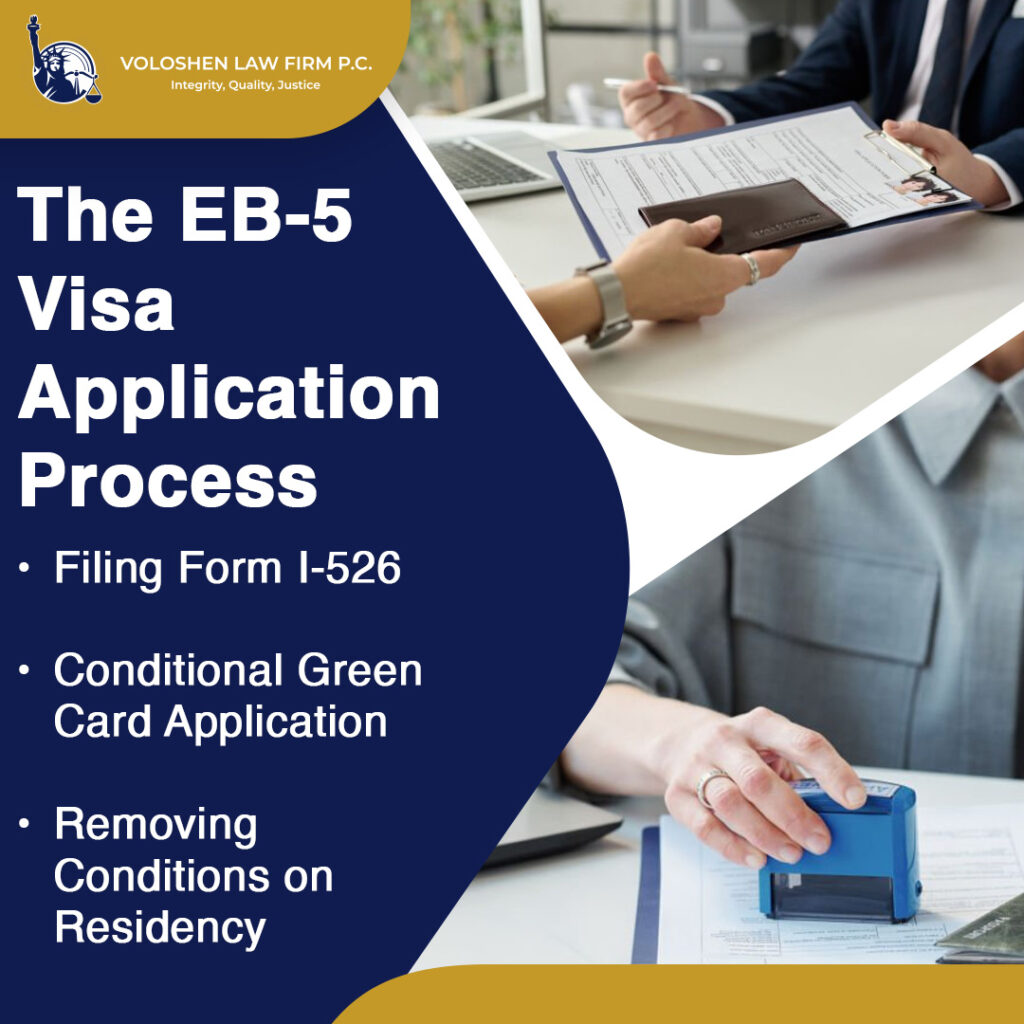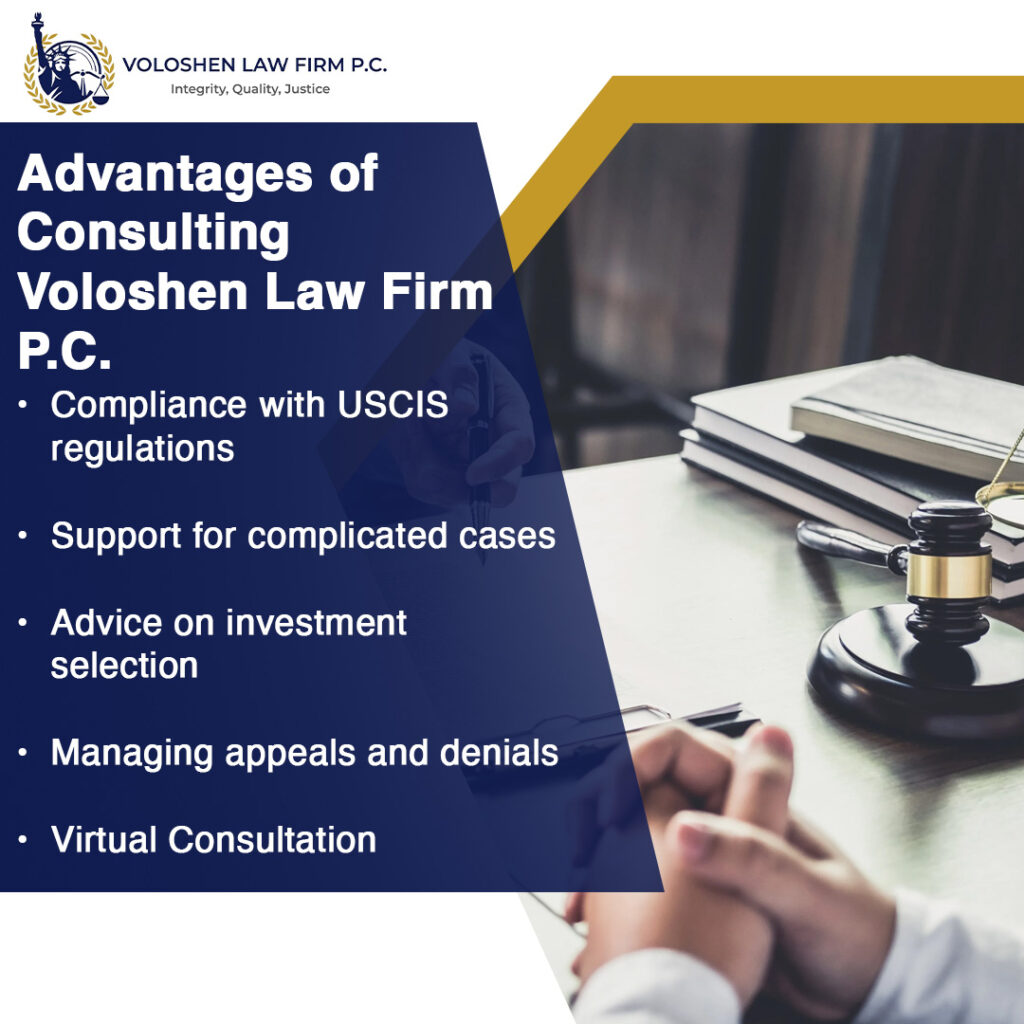Philadelphia investors seeking a direct path to U.S. permanent residency often turn to the EB-5 visa program, but the process is complex, highly regulated, and requires precise documentation. Applicants must demonstrate a lawful source of investment funds, meet strict job creation requirements, and comply with evolving immigration policies. A misstep in filing or insufficient supporting evidence can lead to costly delays or denials. For individuals unfamiliar with U.S. immigration laws and business regulations, handling the EB-5 process without legal guidance can be overwhelming.
Voloshen Law Firm P.C. in Huntingdon Valley, PA, provides strategic legal support to investors pursuing EB-5 visas. With experience in immigration law and investment-based petitions, the firm assists clients in preparing applications, structuring investments, and addressing potential challenges. Whether ensuring compliance with USCIS regulations, responding to requests for evidence, or handling immigration appeals, Voloshen Law Firm works to streamline the process and minimize risks. For those seeking to secure permanent residency through investment, professional legal representation is essential in reducing uncertainty and improving approval outcomes.

Overview of the EB-5 Visa Program
The program for EB-5 visas offers foreign investors an opportunity to secure U.S. permanent residency by making a qualifying investment in a U.S. business. Established to drive economic growth, the program requires investors to contribute capital that leads to job creation for American workers. To qualify, applicants must meet strict investment thresholds and demonstrate that their funds support a legitimate commercial enterprise while complying with all immigration regulations.
Minimum Investment Requirements
To apply for an EB-5 visa, an investor must meet one of the following financial thresholds:
- $1,050,000 investment in a new commercial enterprise in most areas.
- $800,000 investment in a Targeted Employment Area (TEA), which encompasses high-unemployment or rural areas.
Also, the invested capital must be legitimately acquired and allocated to a for-profit company that maintains or adds at least 10 full-time jobs for eligible U.S. workers.
However, recent developments indicate potential changes to the EB-5 program, which you will learn about in the coming sections of this blog.
Role of an Immigration Lawyer in EB-5 Visa Applications
An immigration lawyer plays a critical role in guiding investors through the complex EB-5 visa application process. Legal professionals help investors understand eligibility requirements, structure their investments properly, and ascertain compliance with U.S. immigration laws. They assist in preparing and filing Form I-526, gathering the necessary financial documentation to prove the lawful source of funds, and verifying that the investment meets the required job creation criteria.
Additionally, an immigration attorney helps investors navigate potential legal challenges, respond to Requests for Evidence (RFEs) from the U.S. Citizenship and Immigration Services (USCIS), and address any issues that may arise during consular processing or adjustment of status. By working with knowledgeable immigration lawyers, like Voloshen Law Firm, investors can reduce the risk of application denials and improve their chances of successfully obtaining permanent residency through the EB-5 program.
Choosing the Right Investment Structure
Selecting the appropriate investment structure is a critical step in the EB-5 visa process, as it determines how an investor will meet the program’s job creation and financial requirements. Investors have two primary options:
- Direct Investment – This option requires investors to establish and actively manage their own business. They must continue to be involved in the day-to-day operations of the business and provide at least ten full-time positions for American workers. Direct investments are ideal for individuals who want greater control over their business and have experience managing commercial enterprises.
- Regional Center Investment – Investors can place their funds in government-approved EB-5 regional centers, which pool investments into large-scale projects such as infrastructure developments, real estate ventures, or manufacturing businesses. This option allows for indirect job creation, making it a more passive investment model with less managerial involvement.
An immigration attorney can help investors analyze their risk tolerance, business expertise, and long-term immigration goals to determine which investment path is most suitable. Legal guidance guarantees that the selected investment meets USCIS requirements, reducing the likelihood of complications or delays in obtaining an EB-5 visa.
The EB-5 Application Process
The EB-5 visa application follows a structured process that requires investors to provide detailed documentation and meet specific requirements at each stage. Careful planning and legal guidance can prevent delays and increase the chances of approval.
Step 1: Filing Form I-526
The process begins with the submission of Form I-526, Immigrant Petition by Standalone Investor. This form serves as proof that the investor has met the EB-5 program’s financial and job creation requirements. Investors must provide evidence that:
- The required funds have been invested or are actively in the process of being invested.
- The funds were obtained through lawful means and can be traced to legitimate sources.
- The investment is made in a business that qualifies.
- At least ten full-time positions for American workers will be created as a result of the investment.
USCIS reviews the petition and supporting documents to determine whether the investor meets EB-5 eligibility criteria. Processing times can vary, and legal assistance can help to make sure accuracy and completeness in the application.
Step 2: Conditional Green Card Application
Once Form I-526 is approved, the investor can proceed with applying for a conditional green card, which grants lawful U.S. residency for two years. The next step depends on whether the investor is already in the United States or applying from abroad:
- If in the U.S.: The investor files Form I-485, Application to Register Permanent Residence or Adjust Status to transition to conditional permanent residency.
- If outside the U.S.: The investor applies for an immigrant visa through consular processing, attending an interview at a U.S. embassy or consulate.
A two-year conditional green card, which permits the investor and qualifying family members (spouse and unmarried children under 21) to live, work, and study in the United States, is granted upon approval.
Step 3: Removing Conditions on Residency
Before the two-year period expires, investors must file Form I-829, Petition by Investor to Remove Conditions on Permanent Resident Status. This petition must be submitted within the 90-day window before the conditional green card expires and must demonstrate that:
- The investment remained active throughout the two years.
- The required jobs were created or will be created within a reasonable time.
- The investor maintained compliance with EB-5 program regulations.
Upon approval of Form I-829, the investor and their qualifying family members receive permanent green cards, granting unrestricted permanent residency in the United States. This final step solidifies the investor’s long-term immigration status and eligibility to pursue U.S. citizenship after meeting residency requirements.
Gold Card Visa: An Alternative for High-Investment Immigrants
As per recent developments in U.S. immigration policy, the Gold Card Visa is a proposed program aimed at attracting ultra-high-net-worth individuals seeking U.S. permanent residency. While still under discussion and not yet finalized, this visa would likely require a higher investment threshold, exceeding $5 million, and could offer a faster processing timeline compared to the EB-5 program. The policy is designed to provide greater flexibility in investment options while streamlining the path to residency for qualified investors.
Key Differences Between the Gold Card Visa and EB-5 Visa
- Higher Investment Requirement – The Gold Card Visa may require an investment of $5 million or more, whereas the EB-5 program has a minimum investment threshold of $800,000 (for Targeted Employment Areas) and $1,050,000 in other areas.
- Potential for Faster Processing – The proposed program is expected to offer an expedited application process, catering to ultra-high-net-worth individuals who seek quicker residency approval.
- Flexibility in Investment – Unlike the EB-5 visa, which restricts investments to direct business ventures or government-approved regional centers, the Gold Card Visa may allow a wider range of investment opportunities in various industries or asset classes.
Because the Gold Card Visa is still under development, interested investors should stay informed about legislative updates. Immigration attorneys in Philadelphia’s Voloshen Law Firm can analyze individual financial and immigration objectives to determine whether the EB-5 visa or the proposed Gold Card Visa is the more suitable path.
Immigration Appeals for EB-5 Denials
Denials of EB-5 visa applications can occur for various reasons, often due to incomplete documentation, failure to prove the lawful source of investment funds, or an inability to meet the job creation requirements. A rejection can considerably delay the immigration process and require additional legal action to rectify the issue.
An experienced lawyer of immigration plays a vital role in handling EB-5 denials, assisting investors in analyzing the reasons for rejection, gathering necessary evidence, and filing an immigration appeal. The attorney can also file motions to reopen or reconsider the case, depending on the circumstances. In some situations, investors may need to strengthen financial documentation, provide additional proof of job creation, or clarify project eligibility to address the concerns raised by the United States Citizenship and Immigration Services (USCIS).
Given the complexity of EB-5 visa appeals, legal representation makes sure that investors follow the correct procedures and improve their chances of securing approval.
Common Reasons for EB-5 Petition Denials
The EB-5 visa application process is highly detailed, and denials can occur for several reasons. Investors must meet strict financial, business, and documentation requirements to qualify. Some of the most common reasons for EB-5 petition denials include:
- Failure to Prove Lawful Source of Funds: USCIS requires clear and verifiable proof that all investment funds were legally obtained. Insufficient documentation or questionable financial transactions can lead to denial.
- Lack of Job Creation: Investors must demonstrate that their capital investment results in at least 10 full-time jobs for U.S. workers. If the business fails to generate the required employment within the given timeframe, the petition may be denied.
- Project Ineligibility: The selected investment project must comply with EB-5 program regulations. Any deviation from the guidelines, including investing in an unapproved or high-risk project, can lead to rejection.
- Failure to Maintain Investment – The investment funds must remain “at risk” during the conditional residency period. Withdrawn, mismanaged, or reallocated funds can result in petition denial.
An immigration attorney can help investors navigate these challenges by reviewing the case, preparing additional evidence, and filing motions to reopen or reconsider a denied petition. Addressing the specific reasons for denial with proper documentation and legal arguments can substantially improve the chances of securing approval.
Benefits of the EB-5 Visa
- For foreign investors and their families, the EB-5 visa provides a straight route to permanent residency in the United States and, eventually, citizenship. This program provides several key advantages, making it a preferred immigration option for those seeking long-term residency in the United States.
- No Employer Sponsorship Required – Unlike employment-based visa categories, EB-5 investors do not need a U.S. employer to sponsor their petition, allowing for greater independence.
- Family Inclusion: With a single investment, the investor, spouse, and unmarried children under the age of 21 can all obtain U.S. residency thanks to the EB-5 petition.
- No Educational or Professional Requirements – Unlike other visa programs, EB-5 applicants do not need specific degrees, work experience, or specialized skills to qualify.
- Freedom to Live and Work Anywhere in the U.S. – Investors and their families can reside, work, or study in any U.S. state without restrictions on location or employment.
- By securing an EB-5 visa, investors gain access to the benefits of permanent U.S. residency, business opportunities, and high-quality education options for their children.

Working with an Immigration Lawyer in Philadelphia for EB-5 Success
For investors in Philadelphia, looking to get permanent residency in the United States, professional guidance is vital due to the complex legal and financial requirements involved in handling the EB-5 visa process. An experienced immigration lawyer in Philadelphia makes sure that all documentation is accurately prepared, the source of investment funds is properly verified, and compliance with U.S. immigration laws is maintained throughout the application process. Legal assistance can greatly reduce the risk of delays or denials, helping investors meet job creation and investment requirements effectively.
At Voloshen Law Firm, investors benefit from personalized legal support from professionals with extensive experience in EB-5 visa applications and immigration appeals. The firm assists with structuring investments, preparing petitions, responding to USCIS requests for evidence (RFE), and handling visa denials. With a deep knowledge of U.S. immigration law, Voloshen Law Firm makes certain that clients receive strategic guidance tailored to their financial and immigration goals.
To provide convenient access to professional legal advice, Voloshen Law Firm offers virtual consultations, allowing investors to discuss their cases and receive professional guidance from anywhere in the world. This guarantees that clients, wherever they may be, can proceed with their EB-5 application effectively.
Call Voloshen Law Firm P.C. in Huntingdon Valley, PA, at (215) 437-7854 or igor@voloshenlaw.com if you need help with EB-5 visa applications, investment planning, or appeals and are searching for a knowledgeable immigration attorney in Philadelphia.
